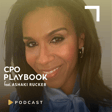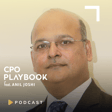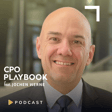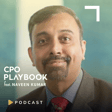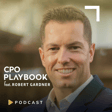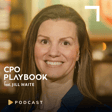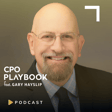Introduction to CPO Playbook Podcast
00:00:01
Speaker
I'm Felicia Shakiba, and this is CPO Playbook, where we solve a business challenge in every episode.
Executive Failure Statistics and Causes
00:00:14
Speaker
According to Forbes, research from the corporate executive board CEB estimates that 50 to 70 percent of executives fail within 18 months of taking on a role. Executives often face immense pressure to deliver immediate results and meet high expectations set by stakeholders and boards of directors. This pressure can lead to hasty decision making and an inability to
00:00:39
Speaker
effectively navigate complex organizational dynamics. Additionally, inadequate onboarding processes and lack of alignment between the executive skill set and the demands of the role can contribute to early failures. Consequently, without proper support, executives may struggle to adapt and deliver sustainable value, ultimately leading to premature exits or performance shortcomings within the critical 18-month timeframe.
00:01:07
Speaker
Our guest today is Tony Bush, head of executive search at Snap. Tony, welcome to
Insights from Tony Bush on Executive Recruitment
00:01:14
Speaker
the show. Thank you. Glad to be here. We're excited to have you. I can't wait for this conversation. Yeah, me too. I was thinking about it this week and really kind of geek out here on assessment for executives. My first question is what distinguishes executive recruiting from general recruiting and what does that entail?
00:01:33
Speaker
It's a really good question because if I think about recruiting as a craft, there's more similarities in both than there maybe are differences. Recruiting is about finding great talent, attracting them, getting them excited about your opportunity, and then making that match and creating great experiences. It's the same thing for both. The differences are with executives, they have a large
00:01:57
Speaker
responsibility at any company. So the questions and assessment we need to make are not just about role and fit, but mindset. Are you well aligned to how we operate at this particular company? Are you okay with making tough decisions? And there's a lot of nuance in some of that assessment. It's not just black and white.
00:02:22
Speaker
And also, when it comes down to it, executives, of course, they make plenty more money. The discussions on what it will take, what works, their stock positions are often much more complicated than folks at an IC level. It's much more about the double click discussion you'll have with a candidate rather than it being black and white with a candidate who might be in their fifth or seventh or tenth year of work. And it's, do you do this or do you not? And with an executive, it's
00:02:49
Speaker
How are you doing that? What's the impact then? Where have you done it? And is this the kind of place you'd like to continue doing it? So there's just a bit more nuance. And there is a lot more pressure, I think, that goes with hiring executive members because they're responsible for a lot more. They are going to be representing different functions or even just at the executive team level with the CEO. And so there's a lot of decision making that goes into
00:03:18
Speaker
Someone at this level would you say absolutely right the stakes are much higher if you hire someone who ends up not being a great match for whatever reason the ripple effects are just much more broad and the impact can be much more negative not only to
00:03:35
Speaker
that seat that they've occupied, but all the people that report up into that executive.
Snap's Executive Hiring Philosophy
00:03:40
Speaker
If you just think back of when you're an individual contributor at a company and you hear about a new leader coming in, you're typically excited and sometimes maybe a little anxious, say, how are they going to operate? What are they going to do for with us? Is it going to work? Then if all said, none of that works well,
00:03:56
Speaker
all those folks who had those expectations and hopes, that all has to change and shift. So mindset of all the downstream folks in the organization, it gets impacted and it can impact work, it can impact production, it can impact revenue. So it can really have really challenging and difficult outcomes for a company, not just that team or organization, it can really derail you.
00:04:22
Speaker
And the process is a little bit longer and more complex, would you say? For sure.
00:04:29
Speaker
Yeah, I've been at plenty of companies where maybe over index a little bit on the assessment and maybe have too many people talking to the individual. But the reason that's done is you really want to make sure that you're verifying the match from all facets. There's many more partners and peers and sometimes it's the board that's involved. Sometimes it's depending if it's a role that's outward
00:04:55
Speaker
perhaps that there's a partner externally that we need to talk to. There's a lot more decision making and factors that need to be considered when you're bringing in someone, certainly a C-suite, but even at the VP level and even some director roles. You really want to make sure that you're checking all the boxes and looking at the individual from all sides to make sure that you're not going to create that negative impact because maybe you didn't look at everything.
00:05:18
Speaker
And there are definitely challenges that you faced. Can you tell me a little bit more about those potential executives with SNAP's unique culture and environment and how they might fit into the role? I would say that I've seen challenge not only with SNAP, but many places I've been. Oftentimes what can happen is that
00:05:38
Speaker
an individual might have a particular perspective on a company or not. For instance, with Snap, and I'll take my own experience, I was not a Snapchat user and now I am of course. But previously that I didn't have the right perspective to really understand the complexity of the platform. Likewise with folks that we bring in who we want to consider Snap,
00:06:04
Speaker
Sometimes executives may think, oh, well, Snap's a great brand, really impressive company, been around for a while in addressing all the challenges that everyone addresses in the market today. Not huge, right? Not a huge company. Sometimes people look at a company and think, oh, well, I'm coming from a large company and that's a small company. It's got to be easier.
00:06:25
Speaker
And it's not. And so it's setting that right perspective and expectation so that when folks do start to talk to us and understand the challenges we want to solve, there's a high level of complexity involved. The speed at which we run is higher than most places I've been. We're highly collaborative, so it's not just swim your lane. You need to reach out and partner with folks who are going to help you achieve
00:06:52
Speaker
the goals for your organization and also the company. The complexity of the work, the speed, the expectations we have on being knowledgeable in not only your work, but your entire function and making sure what's happening on the ground.
00:07:08
Speaker
That isn't always the case at every company. And I think we're different in that way where we do expect people to not only be an excellent executive level, pushing strategy across a company, but really understanding how to operate in a speed and complex environment. How did you determine which behaviors and traits are the most important to possess for an executive to be successful at Snap?
00:07:32
Speaker
What we learned is that, as I mentioned in the last question, our environment is one where we expect people to not only be excellent at the company level and driving strategy, but also understand the ground level detail of the organization you're leading. In order to really make sure that we're assessing the right way, we first wanted to take a look and speak with some of our most successful executives at SNAP and get a sense for how they operate.
00:07:58
Speaker
what it is they do that works so well. And what we found is that some of our best performing execs, they actually enjoy and seek out the detail that their teams are delivering the work product so that they are able to take that information and then apply it to their strategies when they're partnering with other execs in the company.
00:08:20
Speaker
What we did is we model that behavior and then kind of apply that to how we're assessing any other executive that we're hiring for the company. I think in the past, there have been spots in where we've assessed for that, but not in a consistent way across SNAP. And so we want to achieve that same success with every executive we hire. So what we are doing is taking that model and applying it to everyone we want to hire as a leader here.
00:08:46
Speaker
Could you provide an example? Because I think that if you zoom out, you think about maybe like a head of engineering who can go down, drill down into code.
00:08:57
Speaker
and maybe pop back up into strategy and do this kind of yo-yo effect going up and down. But I guess one question I have is like, how might an executive balance those skills without becoming a micromanager? And what does that model look like? If that makes sense. And how do you assess for that in that recruitment process?
00:09:19
Speaker
Yeah, that's a really good question because you're right. One thing you don't want to do is get to a place where your leaders or the people in the organization don't feel the autonomy to perform their roles because we have a very high bar for talent and we hire the best people possible. And then if you get them here and then all of a sudden you're holding their hand the whole way, they're going to wonder why are they there? What that would look like, for instance, in engineering, for example.
00:09:44
Speaker
our leaders will go and attend a code review and really understand the problem that's being solved with the actual coding and then be able to help those leaders or even the engineers doing the work think about trade-offs they can make to perhaps
00:10:00
Speaker
move the process a little bit faster or more efficiently and also provide information or insight from other functions or groups that the executives may be partnered with and maybe bring new information to the table that will help them maybe leapfrog where they were moving the original direction.
00:10:18
Speaker
not getting in the way. It's not about doing their work for them. It's about understanding the problems that they're trying to solve, providing additional information where it can be helpful to advance the work. And then by that interaction, the leader knows really what's happening at the ground level. And then when they are ready to think about strategy shift, pivot and product direction, whatever it might be, they have that ground level information that will be really informative
00:10:47
Speaker
and much more helpful, rather than just looking at surface level reporting or hearing it second or third hand. They're fully knowledgeable of what they're trying to solve. And the way that we assess for that is there are a couple of things that we look at when we think about traits and behaviors. One of them is building high performing teams. So we want to make sure that the people we hire, they can go do the work. But this T-shaped leadership is what I've been referring to as going deep and going across.
00:11:13
Speaker
Making sure that people really who are executives coming in, that they've practiced that and they enjoy it and they don't want to just be, I would call, sort of sitting back and pointing from the sidelines. If they enjoy understanding that detail and then applying it to the overall strategy, that's what we want and we do assess for that. And so it's important to have that desire.
00:11:38
Speaker
to get into the deep. When you think about a T, just the letter T, there's the vertical axis and horizontal. The vertical has to do with being in tune with what is happening in your department. I've seen examples of maybe execs who float at the top of the work and
00:12:00
Speaker
Think of like floating on top of an ocean and there's a ton of stuff below it. You can see the ways but you really don't know what's happening below. When that happens you really are uninformed and can sometimes guide your organization in a direction that
00:12:15
Speaker
can be super negative. On the vertical axis, going deep, as I gave the example, being in a code review, understanding the work, what are the problems being solved? Are there problems that are maybe too challenging to solve and maybe need to think about a different way to get the work done? So getting very deep, that's the vertical.
Snap's Approach to Problem Solving and Diversity
00:12:31
Speaker
And then the horizontal is being able to take that information, partner with functions that help you deliver your work product.
00:12:38
Speaker
informing them and then creating a strategy that can drive everything forward at a company level. So that T-shaped leadership is really part of our culture and how we lead. And it's important to the strategy that SNAP has to move forward.
00:12:54
Speaker
Absolutely. And one of the reasons it's so important is we were innovative culture, right? We're always looking for the best way to solve a problem and move quickly. We have a bias for action. There are some companies that have been part of where you have meetings to plan meetings that you're going to have to solve a problem. We don't do that. We see a problem. We solve a problem. And so when you have the information, you're able to move much more quickly. And so that's why it's really an important facet to have.
00:13:22
Speaker
Could you provide an example of successful executive hires at SNAP who might have come from a different industry but brought valuable skills and perspectives to the role? So there's a couple things I think about when we're looking at talent to bring in potentially from different verticals. And the one thing that I've learned at SNAP is that
00:13:44
Speaker
with our product functions like product management and software engineering they tend to be pretty much centered on our product category and there are particular companies we admire that that have like talent and so we tend to stay pretty pretty close to our functional areas and verticals when it comes to creating the product however you think about corporate functions even
00:14:08
Speaker
my role in the people team or finance or any other thing that might be not associated with creating the product. There are plenty of different verticals where the talent is great. So for instance, think about consulting.
00:14:23
Speaker
Bain, McKinsey. People who come from those scenarios, they are seeing all kinds of different problems all the time that they're solving in different ways. And that kind of experience is super valuable and can be applied and work really well at Snap. So that's I think one example that I point to that we would definitely be excited about.
00:14:42
Speaker
Yeah, I think I can relate because in my consulting practice, I feel like a lot of the work that I do, even just for my clients, it's because I've worked with so many different scenarios, different personalities, different organizational designs, and different industries. I've worked with manufacturing all the way to FinTech or AdTech. And it's so eye-opening because in the consulting world, you see so many of the same problems.
00:15:12
Speaker
over and over again, and you've kind of learned how to adapt in any situation. And so those are the types of, I guess, competencies that you look for in an executive team member who can really bring or, should I say, deal with ambiguity.
00:15:28
Speaker
in any moment. Dealing with ambiguity, would you say, is that the competency you might look for? That's definitely one of the competencies we look for. It's not only at the executive level, we think about it even down to some IC levels because things aren't always black and white. I think anyone who's a professional realizes that, especially in a corporate scenario, you need to
00:15:50
Speaker
ask questions and probe and understand. And sometimes you need to actually move forward in your plan without having all the information. So being able to function in that sort of gray space is important. But what's key is that when you are operating that gray space, you probably need to ask a lot more questions along the way to make sure you're not going down a path that's really off track. You always want to be able to course correct, but yes, I would say that dealing with ambiguity is an important one.
00:16:19
Speaker
And going back to your question on looking at different industries of people who might be successful at SNAP or really any one of the areas that I know corporate America has been really focused on for quite some time and try to get better at is hiring diverse talent. And when you think about
00:16:37
Speaker
hiring diverse talent. There are companies in our country that have been around a very long time who have gotten pretty good at it. So for instance, if we thought about going to hire someone again and so on the corporate functions, looking to the Johnson and Johnson's of the world or Coca-Cola or any of these that have been around for 100 plus years,
00:16:57
Speaker
They have very diverse executive talent and even individual contributor talent. As we continue on our path to really perform well in that area, we do think about looking at companies outside of technology to create a much more balanced and representative company. What strategies
Onboarding and Cultural Adaptation at Snap
00:17:14
Speaker
or methods have you found effective in ensuring that executives at Snap are equipped to be successful in their roles, particularly in terms of understanding the companies
00:17:24
Speaker
unique challenges and dynamics. One of the things that's really important to us is making sure that every executive is tied to what I would call their network. So there's going to be partners that they're going to be hand in hand with doing their work.
00:17:41
Speaker
And so it's going to be really important that they have early and often meetings with those people. So when they come in the door, we want to equip them with a list and even meetings that are preset with their partners, with peers, of course their team and their support group. So for instance, if they need to go and hire, they would talk to me or some of my peers and tell an acquisition to really think about their plan and execution, of course their partnered HR person,
00:18:10
Speaker
They're doing the work hip to hip. We have an outline plan for who it is that they need to go and meet with. Then along the way, let me put it this way, if you jump into something new and you're doing the work, you think it's all great, but maybe you're operating or saying things in a way that doesn't resonate with your team. If you keep saying them,
00:18:31
Speaker
That's not going to be great because they're going to think that, well, this guy's kind of a jerk. Why does he keep saying XYZ in that way? And so we like to provide feedback to the executives so that we catch those things early. And so they can pivot and adjust their approach.
00:18:47
Speaker
maybe adjust to asking more questions and probing before sharing or pulling people into a project. So it's about learning, of course, and we emphasize that most people we hire know that, especially at the executive level that in the first 90 days, it's nothing but a large part of how they operate is by questioning, meeting, learning,
00:19:08
Speaker
understanding the culture, who are the people you should work with and to solve your problems for your team. We do make sure that we get them in front of all the right people, provide plenty of feedback along the way. And this isn't just the first 90 days. This is really, you're thinking about a ramp is typically a year. I'm just at the end of mine and I think I know enough.
00:19:29
Speaker
So there's learning all along the way and they continue to learn after a year. Of course, the meetings and feedback will not be as prescriptive. They'll have their own plans and will have set up relationships with people. But we definitely want to give them a starter kit and make sure they're on the right path, have the right information and the right feedback so that they can be successful. Because like I said earlier, we move a little fast and it can get challenging if you don't have all the right support.
00:19:56
Speaker
And it's a little bit of a dance between when an executive starts their onboarding journey, let's call it. It's having the right mix, that right balance of how fast you solve a problem and get those early wins and how you might need to slow down and say, don't jump in too fast. You need more history. You need more context.
00:20:19
Speaker
That's a tough one. I see you smiling and I know what I'm talking about. I know what you're talking about because I was that way and I think most people who lead and like to have great outcomes, you get a little antsy and you want to dive in and do stuff.
00:20:35
Speaker
And it can be dangerous, right? You do have to exercise patience, plenty of, not plenty, but at least the last, my two leaders said, pace yourself, take time, keep learning, ask questions. And they're so right. Because the more information you gather, the better off you're going to be. The more good you will do, it's
Snap's Culture and Values
00:20:55
Speaker
true. You do have to balance the desire to get in and do stuff and make things happen with being patient, learning,
00:21:03
Speaker
making sure you're operating within the culture and making sure that what you do resonates with the people. That's, I think, way more important than trying to deliver something within your first four to eight weeks. That's just probably not realistic. You almost need like a side hobby to distract yourself from jumping in too quickly. Yeah. I don't know, get on the treadmill or go pick a ball or whatever you like to do.
00:21:30
Speaker
Yeah, exactly. As someone who's been with Snap, I'm very curious. You've been there for a year now, or almost a year now. That's a good amount of time to really know. These days, yeah. Your onboarding process is over now that you've been there for a year, right? For real, yeah. But what aspects of the company's culture and leadership do you find most inspiring? I've had the opportunity to work at really some great companies in Silicon Valley and
00:22:00
Speaker
all super successful and great brands. The one thing that attracted me to Snap that I thought was very different than most is how the people here at Snap actually live our values. I know that may sound sort of hokey because I think a lot of companies can say, hey, here are values. And you put them on a poster and they're in the main meeting area and people go, okay, yeah, great. But they don't deliver me that.
00:22:24
Speaker
thing like now, right? Or people may not be treated very well because it's about the bottom line. The bottom line is important at Snap as well, clearly, right? We're a public company, but our values of being smart, kind, and creative really do resonate in how we operate. It starts at the top. Evan lives these traits or lives these values. Being kind is not just about being nice to people and we should be nice to people, of course, but it's also about
00:22:52
Speaker
being direct and being transparent so that you can arrive at the right outcomes with the person you're working with, providing as much information as you possibly can, whether it be good or bad. So it's important in how we work. And of course, we're innovative, so creative aligns with that perfectly.
00:23:11
Speaker
It's comforting and it makes you feel good and it makes you feel like you can be your authentic self in delivering the work. And I think that's super important for any company because if you have people that are really great and they feel a bit uncomfortable, you're not going to get your best or the best out of them. I would say that the way that we really exercise and deliver values, that's the thing that attracted me and that I find really unique and really great about Snap.
00:23:36
Speaker
That's good to hear from someone in your position because you're the one assessing the first round of people who to see if they're actually going to live their values and what examples they might have in their path to show that. I think it's one of the hardest things to do as an organization, not just live your values at the top, which is of utmost importance.
00:23:58
Speaker
but also permeate those values all the way down to those newcomers, right? People who walk in the door. And it's probably one of the reasons why SNAP has been successful and is still moving towards that future. I think that's a really big piece of your success, if I were to guess. People stay because they have a good time. There's a lot of great work to do.
00:24:20
Speaker
What's the saying? People, I think they join a company typically for opportunity or what they might be able to gain, but they stay because of their leader. That's true, at least for me. And I think most people at Snap whose leaders really live our values, it makes you feel like you're
Conclusion and Call to Action
00:24:37
Speaker
seen. And so that's important for people.
00:24:40
Speaker
Amazing. Awesome. Thank you so much, Tony. This has been so great and so insightful. And I hope so many people learn from everything that you've shared today on how to find their executive team members. So thank you so much. Thank you. It was a lot of fun. I really appreciate you inviting me. I've become a fan of podcasts and I've become a fan of your podcast. I'll be listening to all your future guests.
00:25:06
Speaker
That's Tony Bush, head of executive search at Snap. If today's episode captured your interest, please consider sharing it with a friend or visit cpoplaybook.com to read the episode or learn more about leadership and talent management. We greatly appreciate your rating, review and support as a subscriber. I'm Felicia Shakiba. See you next Wednesday and thanks for listening.



